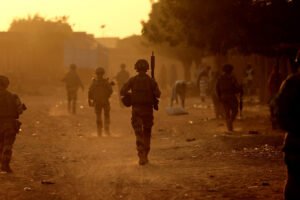Data publikacji w serwisie: 14 lipca 2022 r.
Call for papers

EASTERN EUROPEAN URBAN NARRATIVES OF CONFLICT (issue no. XLIX/1/2024)
Editors: Seth Graham (University College London), Rachel Morley (University College London), Beata Waligórska-Olejniczak (Adam Mickiewicz University)
1) Scope of the special issue and the relevance of the subject:
The 2022 edition of ‘Millennium Docs Against Gravity’, Poland’s largest documentary film festival, featured a Susan Sontag retrospective that included her work Waiting for Godot…in Sarajevo, made in the Bosnian capital during the siege and codirected with Nicole Stéphane. The film, which is often described as Sontag’s lasting gift to Sarajevans and which gave them hope and the possibility of responding to suppressed emotions, today inevitably brings to mind places such as Kyiv, Kharkiv and Mariupol, whose suffering inhabitants and ruined architecture have made us doubt the existence of a civilized world. Focusing attention on the mission of art and the role of the artist as an engaged witness of reality, this special issue of “Studia Rossica Posnaniensia” will concentrate on urban experiences of all kinds of conflicts: military, political, interpersonal, ethnic, religious, environmental, etc. We would like to pinpoint the role of Eastern European cities as sites of power and powerlessness, as spaces where pain is/was inflicted, contemplated, embodied, expressed or (re)negotiated, and as intersections of different cultures and traditions (e.g. Catholicism and Orthodoxy). We would also welcome proposals rooted in gender studies, queer studies, post-colonial studies, disability studies, performative studies and animal studies, that may offer perspectives on the city space as a battlefield for one’s dignity, rights and identity. We expect that authors might refer to Sontag’s belief in the artist’s social and ethical duty to explore the link between the aesthetic and the political as well as the relationship between the mind and the body in urban environments.
Treating Russian and Soviet literature, cinema and language as a point of departure for discussion, we anticipate that the special issue will address, among others, the following questions:
- What is the language of conflict as expressed in visual images, metaphors and verbal communication? Are there recurrent formulas and images in Eastern European cultures? Are they linked specifically to one culture or are they multicultural?
- How does urban space endorse or prevent conflicts and/or wars?
- How/why do specific cities become the primary sites of conflict?
- How are future urban conflicts imagined, predicted and narrated?
- How do Eastern European cities engage in negotiating conflicts related to sexual identity? What is the role of liminal and transit spaces in this domain? Does urban architecture blur or define sexual conflicts?
Both theoretical works and discussions of artistic representations are welcome. We are particularly interested in proposals that seek connections between various disciplines, such as literary studies, film studies, linguistics, urban studies, memory studies, anthropology, and urban psychology, to name just a few.2) Possible topics and areas of discussion include, but are not limited to, the following:
– conflicts of marginalized nationalities and ethnicities
– places that are ignored, neglected, degraded or destroyed as a result of (military) conflicts
– literary and cinematic first and second cities
– monster cities – city monsters
– navigating the psycho-fantastical geography of urban conflict
– urban memory spaces
– human vs. non-human in cities
– bodies in pain
– travel writing in the context of social, political and military conflicts
– common challenges of survival in the city
– city diaries, cinematic cities
– sounds & silence in the city under siege
– urban nature-culture
– crime fiction, speculative fiction, nuclear narratives, utopias/dystopias
– healing spaces in the urban context
– city diasporas, biopolitics, surveillance
– environmental justice, ecofiction & ecocatastrophes
– Holocaust, genocide, urban ghettos
– urbicide, the killing of cities, urban destruction, death in the city
– representations of trauma, grief, loss, mourning, works on witnessing conflicts
– urban narratives as metaphors of fear & apocalypse
– Eastern European war testimonies
– fragmented cities – fragmented nations
– decaying empires
– working women in the city, social and political control, violence and discrimination
– liminality of the city, borderlands, peripheral spheres, intersections in the context of city architecture
– childhood conflicts in the city
– cities of revolution3) Deadlines and editorial timetable:
Publication of the CfP online (in English, Russian and Polish): 15.07.2022
Submission of abstracts: 15.11.2022
Decision of the editors’ committee regarding abstracts: 15.12.2022
Submission of complete articles: 15.05.2023
Results of reviews: 30.06.2023
Submission of revised articles: 15.09.2023
Publication of the issue: 30.06.2024
Languages of submissions: English, Russian and Polish;
Abstracts (1000-1500 characters, in the language of the article) should be sent by email to the editors of the volume by November 15, 2022: Dr Seth Graham (s.graham@ucl.ac.uk), Dr Rachel Morley (rachel.morley@ucl.ac.uk), Dr Beata Waligórska-Olejniczak (beata.waligorska@amu.edu.pl).
We kindly ask you to submit complete papers (25,000-40,000 characters with spaces including bibliography) through the OJS platform at https://pressto.amu.edu.pl/index.php/strp/login
Editorial guidelines can be found at:
https://pressto.amu.edu.pl/index.php/strp/about/submissions
More information about the journal is available on the journal’s website: http://srp.amu.edu.pl/en/about-the-journal/
